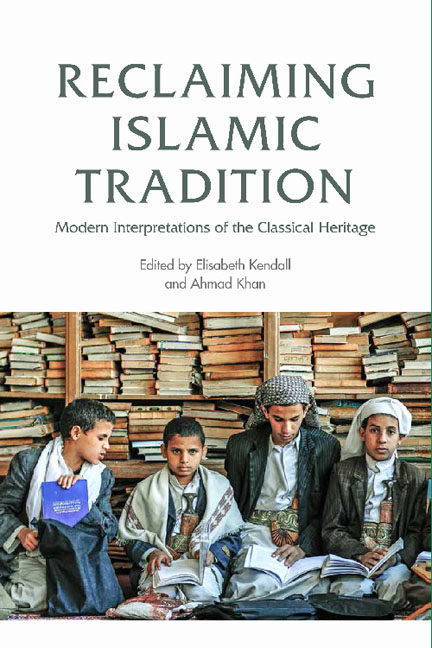Book contents
- Frontmatter
- Contents
- Acknowledgements
- About the Contributors
- Introduction
- 1 Modern Shiʿite Legal Theory and the Classical Tradition
- 2 Muḥammad Nāṣīr al-Dīn al-Albānī and Traditional Hadith Criticism
- 3 Islamic Tradition in an Age of Print: Editing, Printing and Publishing the Classical Heritage
- 4 Reaching into the Obscure Past: The Islamic Legal Heritage and Reform in the Modern Period
- 5 Reading Sūrat al-Anʿām with Muḥammad Rashīd Riḍā and Sayyid Quṣb
- 6 Contemporary Iranian Interpretations of the Qurʾan and Tradition on Women’s Testimony
- 7 Ibn Taymiyya Between Moderation and Radicalism
- 8 The Impact of a Sixteenth-Century Jihad Treatise on Colonial and Modern India
- 9 Jihadist Propaganda and its Exploitation of the Arab Poetic Tradition
- 10 Contemporary Salafi Literature on Paradise and Hell: The Case of ʿUmar Sulaymān al-Ashqar
- Index
8 - The Impact of a Sixteenth-Century Jihad Treatise on Colonial and Modern India
Published online by Cambridge University Press: 11 November 2020
- Frontmatter
- Contents
- Acknowledgements
- About the Contributors
- Introduction
- 1 Modern Shiʿite Legal Theory and the Classical Tradition
- 2 Muḥammad Nāṣīr al-Dīn al-Albānī and Traditional Hadith Criticism
- 3 Islamic Tradition in an Age of Print: Editing, Printing and Publishing the Classical Heritage
- 4 Reaching into the Obscure Past: The Islamic Legal Heritage and Reform in the Modern Period
- 5 Reading Sūrat al-Anʿām with Muḥammad Rashīd Riḍā and Sayyid Quṣb
- 6 Contemporary Iranian Interpretations of the Qurʾan and Tradition on Women’s Testimony
- 7 Ibn Taymiyya Between Moderation and Radicalism
- 8 The Impact of a Sixteenth-Century Jihad Treatise on Colonial and Modern India
- 9 Jihadist Propaganda and its Exploitation of the Arab Poetic Tradition
- 10 Contemporary Salafi Literature on Paradise and Hell: The Case of ʿUmar Sulaymān al-Ashqar
- Index
Summary
Introduction
This chapter analyses the views on Islam of a little-known early Orientalist scholar working in Madras, Michael John Rowlandson (1804–94), and of two modern Muslim scholars in India, Muhammad Husayn Nainar and Ahamad Ilyaas Vilayatullah. The discussion here will focus on a most interesting Arabic jihad treatise called Tuḥfat al-mujāhidīn fī baʿḍ aḥwāl al-Burtugāliyyīn. Written by a Keralan scholar, Sheikh Zainuddin Makhdum (d. 1583), this work deals with events from his own time, the period of Portuguese domination of the Indian Ocean, and their violent attacks on Malabar.
This treatise urges the Muslims in Bijapur to wage jihad against these ferocious invaders. Zainuddin makes telling comparisons between the famous jihad waged by the Levantine Muslims in the twelfth and thirteenth centuries against the Franks and the much less well-known jihad fought by the Indian Muslims in Bijapur against the Portuguese in his own time, three centuries later. Thus the relevance of medieval concepts of jihad, developed and refined in the Levant in the context of the Crusades, remained firmly in place in early modern India.
Zainuddin calls the Portuguese invaders the Franks (al-Afranj) and he records their history from the time of their arrival in Calicut in 1498 under Vasco da Gama. In his author's preface, Zainuddin expressly states that he has composed his narrative to arouse the faithful to engage in jihad against ‘the worshippers of crosses’ (ʿabada al-ṣulbān). Zainuddin stresses the great reward that awaits those who engage in fighting jihad against the Portuguese. He is not, however, hostile to the Hindus with whom he and his fellow- Muslims have long lived harmoniously. The jihad he advocates is a defensive one against the foreign European Christian invaders of Malabar. Zainuddin frequently uses the same kind of anti-Frankish tropes and formulaic curses regularly found in the twelfth- and thirteen-century Arabic chronicles of the Levant that recount the history of the Crusades. For example, when he mentions the attacks of the group he calls ‘the Portuguese Franks’, Zainuddin writes ‘May God forsake them’ (khadhala-hum Allāh), a curse frequently used in Muslim chronicles of the Crusading period in the Levant.
- Type
- Chapter
- Information
- Reclaiming Islamic TraditionModern Interpretations of the Classical Heritage, pp. 204 - 222Publisher: Edinburgh University PressPrint publication year: 2018



